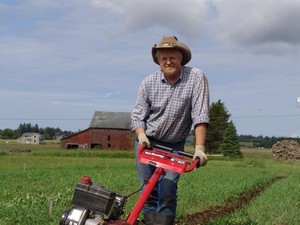20 May Wed 2009
Niche Marketing and Subsidizing Your Customer
Yesterday, I finished reading Nickel and Dimed: On (Not) Getting By in America by Barbara Ehrenreich (2001). I had been a fan of Ehrenreich since the early 90's, but I didn't bother to read her book when it came out because I knew the subject so well. But I lucked into a copy recently and it was a quick and interesting read. Also yesterday, I viewed a short video of Seth Godin that was recommended by another blogger on this site. Godin is big on creating our own "tribes" and moving away from mass marketing. A third confluence I thought about in the last 24 hours was Samuel Fromartz' book Organic, Inc.: Natural Foods and How They Grew (2007). These three influences have helped solidify the direction my direct marketing has taken in the last year.
Ehrenreich is a long-time socialist-leaning investigative journalist who also has a Ph.D. in cell biology. After Clinton's ill-conceived "welfare reform" in the 90's, she set out to see how bad it really was for the poor. She took a series of minimum-wage jobs in three separate states and tried to make a living. She quickly found out it was impossible to make a living on the bottom of the wage scale. Her book's penultimate paragraph says a lot about America. "When someone works for less pay than she can live on -- when for example she goes hungry so that you can eat more cheaply and conveniently -- then she has made a great sacrifice for you, she has made you a gift of some part of her abilities, her health, and her life. The "working poor," as they are approvingly termed, are in fact the major philanthropists of our society. They neglect their own children so that the children of others will be cared for; they live in substandard housing so that other homes wil be shiny and perfect; they endure privation so that inflation will be low and stock prices high. To be a member of the working poor is to be an anonymous donor, a nameless benefactor, to everyone else (page 221)."
Seth Godin also has a new book out, called Tribes: We Need You to Lead Us (2008). What I found interesting is his assertion that mass marketing is not needed and his notion of "telling a story." This is niche marketing in a nutshell. The aspect of forming our own tribes is a good starting point for those people who want to do something locally and under the radar of government.
Fromartz' book was one of my reads over the 2007-2008 winter and it made some very good points about how the organic movement has been hijacked by agribusiness. However, the concept that really resonated with me was the idea of subsidizing your customers. Here is his quote from page 102. He is talking about a young couple trying to make a living on the land. “As with any start-up, you could argue these were the lean years. But a start-up is predicated on the assumption that the business will take off, that a profit will ensue and an asset will grow in value. The farm was on the right track, but it was taking an awful lot of work and patience to wring even a basic living from the land. I later told Hedin that given what he was making after a sixty- or seventy-hour workweek, he was in effect giving his customers a food subsidy.”
Putting all these together, what we are doing with sustainable agriculture, CSA programs, farmers markets, and the like, is to subsidize our customers. Someone who works as a high school teacher, for example, certainly works hard but is getting a subsidized CSA box whenever they drive out to the farm. This is not the case of the teacher ACTIVELY oppressing the farmer, of course, but simply taking the advantages meted out to them by the system for which they work. In industrial corporate agriculture the subsidy comes from the energy slave of 65 million-year-old petroleum products that are used as inputs. The fossil fuels keep the prices down. Instead of slaves producing cheap food for the supermarkets, the energy slave of oil produces cheap food. As long as the farmer stays within the mainstream system, he (or she) can MAYBE make enough to keep themselves well-fed and anesthetized to the real cost of food - pollution, soil depletion, and the US wars to secure oil supply lines. When we try to break out of the fossil-fuel production box (or trap), we basically devolve into semi-slavery, comparable to the wage slaves profiled so well in Ehrenreich's book. The solution, as far as I can see it, is something along the lines of what Godin is talking about - niche marketing moved up to the next level of self-made tribes. Back in the late 60's and early 70's, I started to see some advantages in doing the right thing. In other words, I started to see some payback for my antiwar and co-op efforts. These were measured in human, subjective terms, rather than money or position. We thought of ourselves as the counterculture back then and tribes were another organizing motif. As the circle turns again, the same ideas have new currency.

